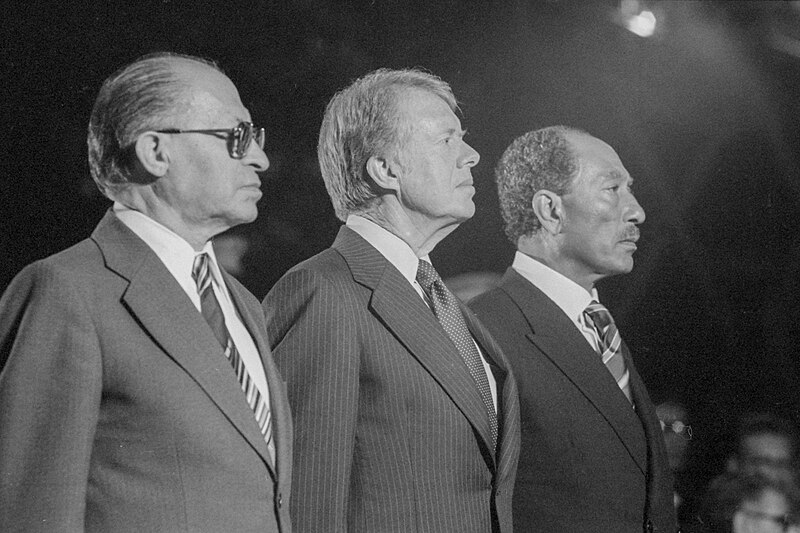With the recent passing of former president Jimmy Carter, the time has come to consider the mixed legacy he has left behind. Although remembered for pursuing and signing the Camp David Accords, which facilitated the first peace treaty between Israel and an Arab state, this merely scratches the surface of his Mideast legacy.
Upon closer reflection, Carter’s actions after his presidency caused substantial harm to Israel and fostered a hostile narrative about the Israeli-Palestinian war whose pernicious effects continue to be felt.
Settlements and the push for a Palestinian state
Carter’s presidency was marked by intense conflict with Israeli prime minister Menachem Begin over Israel’s settlement activities in Judea, Samaria, and the Gaza Strip.
Carter’s adamant demand to reserve these territories for a Palestinian state clashed with Israel’s strategic interests, causing a rift that influences US-Israeli relations to this day, Carter championed a narrative that positioned Israel as an aggressor.
Carter’s relentless push for a Palestinian state was a cornerstone of his foreign policy, especially after he left the presidency.
Post-presidential advocacy and criticism
Carter’s criticism of Israel grew sharper after his presidency. He repeatedly blamed Israel for the ongoing war, ignoring the complexities and the intransigence of Palestinian leaders. Carter’s belief that he could single-handedly mediate peace reflected a fundamental misunderstanding of the region’s realities.
Wngaging with terrorists and spreading misinformation
Carter’s interactions with Hamas leaders, such as Khaled Meshaal and Ismail Haniyeh (killed this past year by the IDF following the Hamas massacre of October 7, 2023), represented some of the most disturbing aspects of Carter’s post-presidential efforts.
By portraying Hamas as a legitimate peace partner, Carter lent undeserved legitimacy to a terror organization committed to Israel’s decimation.
Carter’s consistent baseless claim that Hamas was interested in peace undermined international efforts to isolate the group.
Carter’s ultimate naivete was on full display in his role as the US observer and facilitator of the January 1996 elections that established Yasser Arafat as the “democratically elected” leader of the Palestinian Arab people. Although Carter liked to take credit for the “democratic” nature of the PA elections in numerous articles and speeches, this couldn’t have been further from the truth.
Covering the PA elections which Carter oversaw in 1996, I asked him about the allegation that Arafat had blown up the home of
his electoral opponent.
Carter only responded with a chuckle and said, “We have problems like that in Chicago, too.”
The most unkindly cut of all occurred during the 2014 war between Israel and Hamas, when he was called to remove Hamas from the US list of terrorist organizations.
His disproportionate criticism of Israel, coupled with a lack of condemnation for Hamas’s terrorist activities, highlighted his bias and alienated him from the mainstream Jewish community.
Apartheid label
Carter’s 2006 book, Palestine: Peace Not Apartheid, equated Israeli policies with apartheid, a grossly inaccurate and damaging comparison.
The book’s portrayal of Israel as the ultimate obstacle to peace ignored the consistent rejection by Palestinian leaders of any peace offers. Carter’s refusal to acknowledge these rejections transformed the former president into a purveyor of harmful misinformation that continues to haunt Israel’s international standing.
Antisemitic stereotypes
-Carter’s rhetoric often veered into antisemitism, as seen in his comments about Jewish
influence over US politics and media. These statements, which echoed dangerous stereotypes, drew widespread condemnation.
By framing Jewish criticism of his book as an orchestrated attack, Jimmy Carter’s legacy is one of significant harm and is detrimental to Israel’s security and its relationship with the United States.
By legitimizing terrorist groups and perpetuating a damaging narrative, Carter will be remembered as the first critic of Israel to pin the indelible apartheid label on the Jewish state, distracting Middle East observers from Carter’s accomplishment as the facilitator of the 1979 Camp David Peace Accord.









